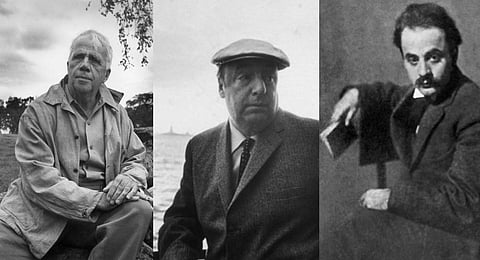Chasing the shadows
KOCHI: The woods are lovely, dark and deep,
But I have promises to keep,
And miles to go before I sleep,
And miles to go before I sleep.”
These are one of the most famous lines of poetry. Written by eminent writer Robert Frost around a century ago, these lines from the poem ‘Stopping by Woods on a Snowy Evening’ still influence every reader — they touche them somewhere deep.
No one can escape from that special hold it has, including young readers like Rahul K. “Frost’s words led me to believe that I have an incomplete life that is yet to be filled, something more to be done,” says the budding poet.
Some writings are like that, they gain a life of their own — become timeless.
Also, these types of deep ruminations involve a darker approach towards literature where you excavate your subconscious drives, desires, compulsions, and fears — traumas of the past. The shadow self comes out to play. The shadow is the part of the psyche that contains all the unknown aspects of ourselves. This includes repressed emotions, traumas, and denied parts of our personalities.
Death is inside the folding cots.
It spends its life sleeping on the slow mattresses
under the black blankets and suddenly breathes out
It blows out a mournful sound that swells the sheets,
and the beds go sailing towards a port where death is waiting, dressed like an admiral.
This is a verse from ‘Nothing but Death’ by Pablo Neruda, the famous Chilean poet known among the general public for his romantic writings. However, this is one of those poems where he explores his darker thoughts, describing death as an entity and further elucidating it with visual details.
Neruda puts the reader in an uncomfortable position by detailing death, corpses, murder, and despair. In spite of the uncomfortable imagery, the admirable realism, pessimistic beauty, and symbolic layers give a kind of cathartic feeling to those who read him.
And the cup he brings,
though it burns your lips,
has been fashioned of the clay.
Which the Potter has moistened with his own sacred tears.
These lines are from ‘On Pain’ by Khalil Gibran, the legendary Lebanese-American writer. He intended that to relate to the Unseen is to relate to our pain. The imagery in the poem controls the narrative yet it provides an avenue for subjective conclusions.
Explorations of the darker psyche have been there since time immemorial. In Malayalam, poets such as Balachandran Chullikadu and Rafeeq Ahammed aced at exploring these ‘shadows’, one’s hidden psyche.
Now, several budding English writers in Kerala have made their ‘shadows’ their muse. They unspool the layers within, write about their deep, dark desires, and obscure trauma that’s locked up in the innards.
“This type of approach can also seem scary at times since poetry is a form of escapism, a comfort place. Polluting it with hopelessness and dark imagery makes it sort of agonising,” says Jerald Jeyasingh, a nurse and poet. However, sometimes the writings of shadows connect much more with readers.
What if I sell my soul?
What if they have a hold?
I’ll be doing things that I’m told to,
but I’ll have all the richness of diamonds
and gold too.
These lines are from Jerald’s poem ‘Soul Gold’. “Though there is agony in ‘shadow poetry’, it can also be a form of catharsis and a reflection of the suppressed emotions that are buried inside of me, which I somehow try to communicate,” Jerald explains.
For Abhimanyu R, poet and professor, poetry is a way to let out and encounter his deepest, darkest deires.
He writes:
Let the vultures know where,
Let the maggots rule.
Let me rest in your graveyard
Dine with me, and pour me bliss.
Farewell.
These lines by Abhimanyu deal with the confrontation of slaughter and the description of the eerie aftermath — leap towards a world of petrifying fantasy.
“I don’t write poems; I prefer to say I bleed poems,” he says.
“So I let snakes and bats wander in my lines as metaphors and similes. That is also a realm of poetry, where bleakness is celebrated.”
Nandana Nair is another young English poet whose maiden book Kaleidoscope was released recently. “Pessimism is how I approach writing, but I believe it is more than that; I reflect on reality. Most poems in my collection are products of shadow poetry,” she says. “I think my writings have adapted the shadow way.”
This shadow way is now reflected among many new writers. However many of them caution, tread on the path carefully as unexpected results can be ridiculously dark, though awesome.
According to Nithya Mariam John, poet, translator and assistant professor, poetry expresses what cannot be said otherwise. “At times, poetry serves as a tool for writers to bring out their dark desires,” she says.
“These desires lurk behind the curtains, emerging through automatic writings — ones that were buried deep underneath, akin to Freud’s iceberg. The libido and the thanatos find expressions in poetry. A good poem always suggests but never explains. Therefore, in another sense, every poem is a shadow of
an idea, an emotion, or whatever drives the creativity of the poet.”

